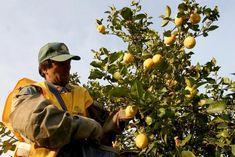
Argentinean exporters are gunning for growth and are aiming to increase their presence in the UK by shipping a wide range of citrus fruits.
With an estimated crop of 2.5 million tonnes this season, Argentinean fruit is already a big hitter in Europe and exporters are keen to advance their sales. The country’s citrus season runs from March to November - ample time for exporters to establish an active presence in the market.
Compared to other markets, the UK has often been described as challenging, one that demands growers work to exacting specifications. An Argentinean exporter notes that convenience and appearance are priorities in the UK but many are optimistic that more volumes can be shipped there in the future.
“Volumes to the UK will increase, as has been the case for the last 10 years,” predicts San Miguel’s commercial manager Adolfo Storni.
Citrus powerhouse San Miguel enjoys a dominant position in the Argentinean lemon sector, accounting for 35 per cent of the country’s exports. But it is not just lemons that are popular. According to Storni, San Miguel’s easy peeler varieties such as mandarins, satsumas, clementines, clemenvilles, Ellendales and ortaniques, also enjoy favour in the UK.
San Miguel is aiming to export 150,000t of citrus to nearly 40 countries this year. The producer-exporter celebrated its 50th anniversary in 2004 and to mark the occasion, an official party will be held in April.
As well as its fresh fruit operations, Storni notes that San Miguel also enjoys a strong industrial business, producing fruit for salads and juices.
According to Storni, San Miguel, which gained EurepGAP certification four years ago, would consider increasing its production of unwaxed lemons and mandarins, should there be sufficient demand for these items.
San Miguel notes that freight and internal costs are increasing and the Argentinean peso is getting stronger. “The strong Euro and pound help, but not enough to offset other costs,” Storni says.
In terms of short-term plans and initiatives, exporters do not anticipate much varietal change. However, growers are adopting a more long term position. “Changes will be seen in the next five years and San Miguel has been very active in developing and importing new varieties,” says Storni. “In 2004 we inaugurated a new greenhouse in Uruguay that will give us 60,000 plants a year. And our packhouse and research and development department in Tucumán is considered to be one of the best in the southern hemisphere.”
Argentina’s main rival when shipping to the UK is South Africa. According to Storni, Uruguay is a partner of Argentina, with similar strengths and weaknesses.
“Other countries such as Chile and Australia are regional competitors in some markets, but not in Europe,” Storni notes, adding that Argentina enjoys a number of advantages over its rivals. These include producing fruit at a competitive cost and offering customers high quality volumes.
Storni further notes that the Argentinean citrus industry is adopting many practices to make itself more competitive in the UK market. “There is a lot of work on the logistics side to try and ensure that we have full programmes for the whole summer season,” he says.
Fellow marketer Ledesma also believes that Argentina has an edge over its rivals. “Our exporters enjoy a solid, long-standing reputation for offering quality products,” says the company’s commercial and logistics manager Gonzalo Montagne.
Originally specialising in Valencia oranges, Ledesma later expanded its export portfolio to include other citrus fruits. The company currently ships a wide range to the UK such as Valencia oranges, Ruby Red and Star Ruby grapefruits, Eureka lemons and satsumas under the brands Ledesma, Calilegua, La Jujeña and Yuchan.
The company produces citrus in the Jujuy, Salta and Tucumán provinces in the northwest of the country as well as in the Entre Ríos and Corrientes provinces.
Shipments to the UK peak around the March-April period and according to Montagne, the firm is hoping to increase its volumes by a significant 50 per cent this season.
“Ledesma has already taken on seven new growers and is looking to take on more during the course of this year,” Montagne reveals, adding that the firm devotes 2,000 hectares of land to citrus, avocado and mango plantations in Jujuy province and 400ha to citrus plantations in Entre Ríos province.
As well as the fruit orchards, Ledesma also runs a state-of-the-art fresh fruit packing plant in Jujuy province, which gained EurepGAP and ISO 9002 certification in 1999.
Similarly to other Argentinean exporters, Ledesma is keen to gain entry into new markets and has set its sights on the US and China - two countries that could turn out to be extremely lucrative in the future.
In terms of the UK market, Argentinean exporters believe that some work still needs to be done but with their larger volumes and strong reputation, they are more than ready to rise to the challenge.



